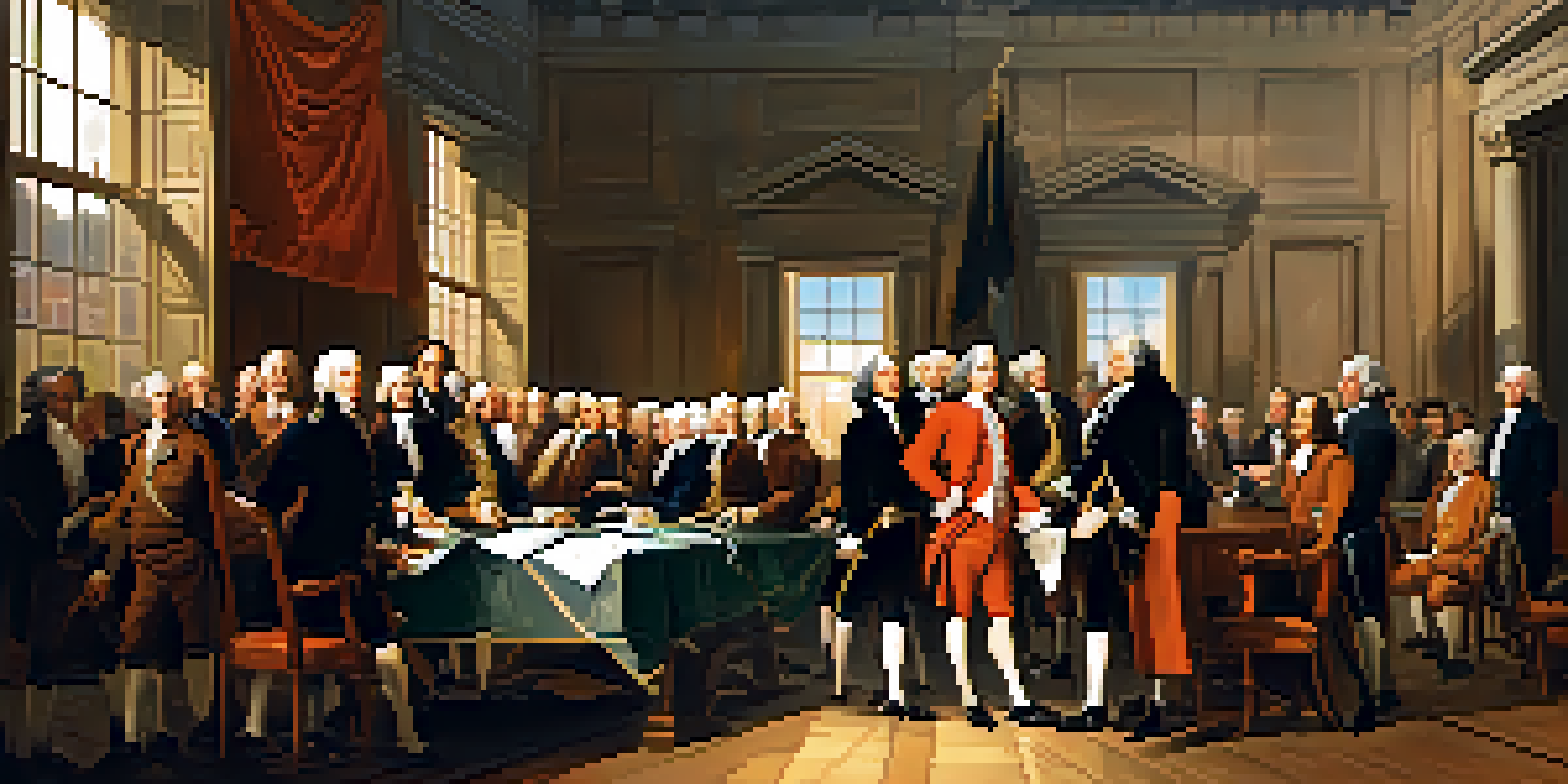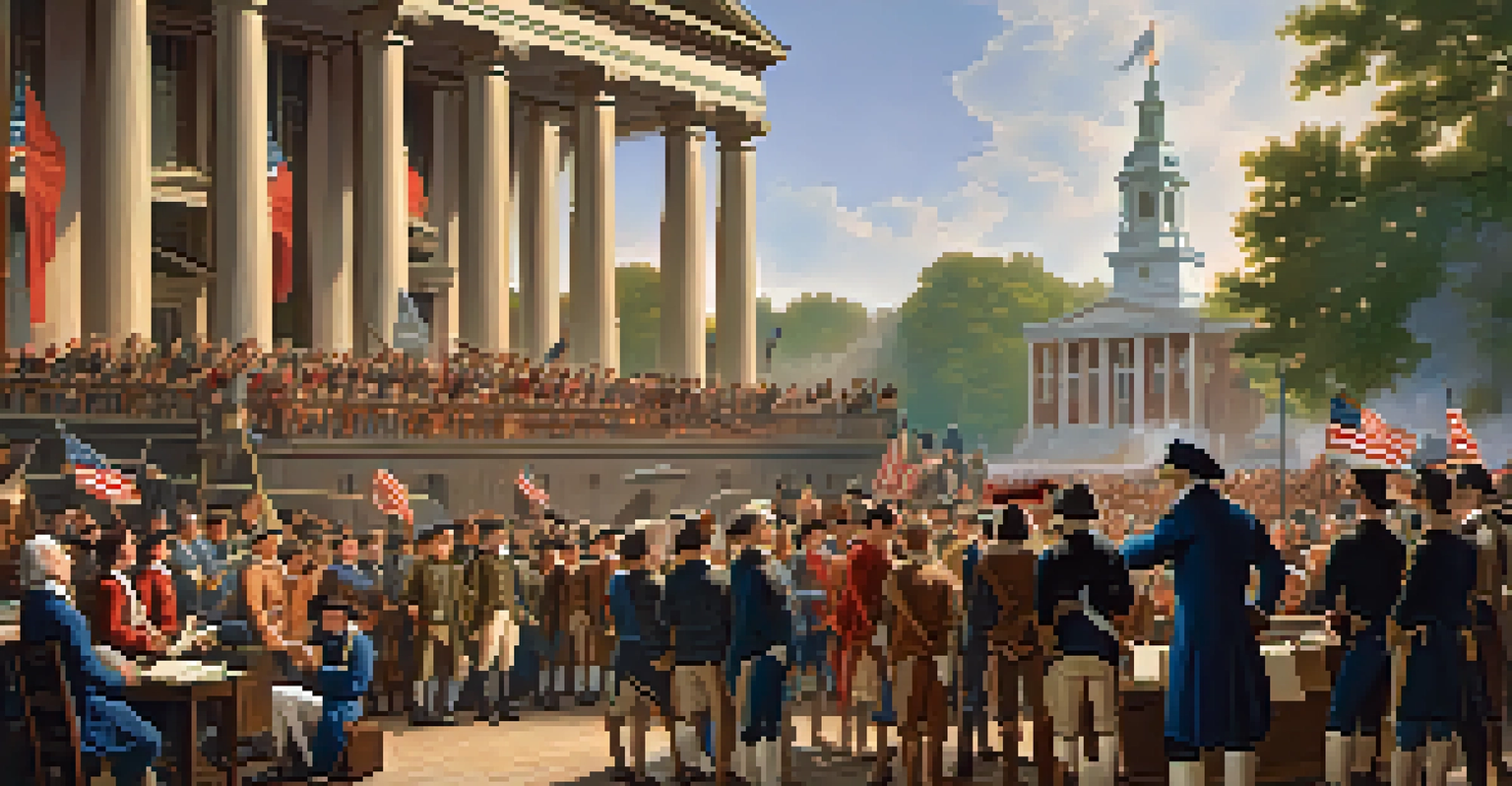The Declaration of Independence: Philadelphia's Historic Moment

The Birth of an Idea: Context of Independence
In the years leading up to 1776, tensions between the American colonies and British authorities were escalating. Colonists felt increasingly stifled by taxes and lack of representation, sparking a desire for independence. This brewing discontent laid the groundwork for a revolutionary idea: the notion that people have the right to govern themselves.
The price of freedom is eternal vigilance.
The Enlightenment thinkers, such as John Locke, influenced colonial leaders with ideas about natural rights and government by consent. These concepts resonated deeply with many colonists, who began to envision a society built on liberty and equality. As discussions about independence intensified, Philadelphia emerged as a gathering place for revolutionary minds.
The atmosphere in Philadelphia was electric, filled with debates and discussions among influential figures like Benjamin Franklin and Thomas Jefferson. These leaders recognized the historical significance of what they were about to undertake—declaring independence from one of the most powerful empires of the time.
Gathering in Philadelphia: The Continental Congress
In May 1775, the Second Continental Congress convened in Philadelphia, a pivotal moment for the colonies. Delegates from various states gathered to discuss their grievances with Britain, but as the situation escalated, the conversation shifted toward independence. This congress became the primary governing body during the American Revolution.

With the stakes so high, the delegates faced immense pressure to reach a consensus. They were not only representing their colonies but also the hopes of millions who longed for freedom. The discussions were heated, with some delegates urging immediate action, while others advocated for reconciliation with Britain.
Colonial Discontent Sparks Revolution
Growing frustrations over British taxes and lack of representation fueled the desire for independence among the American colonies.
Ultimately, the congress decided that a formal declaration was necessary to articulate their demands and intentions. This decision set the stage for a moment that would forever change the course of history.
Drafting the Declaration: A Collective Effort
The task of drafting the Declaration of Independence fell primarily to Thomas Jefferson, who was chosen for his eloquent writing style and revolutionary ideas. Collaborating with other committee members, including John Adams and Benjamin Franklin, Jefferson crafted a document that would become the bedrock of American democracy. This was no small feat, as they aimed to articulate the aspirations of a nation.
Liberty, when it begins to take root, is a plant of rapid growth.
Jefferson's draft went through several revisions, with debates about specific language and ideas. The committee aimed to ensure that the document would resonate with the public and justify their break from Britain. The famous phrase 'life, liberty, and the pursuit of happiness' emerged as a powerful expression of the colonists' ideals.
After much deliberation, the final draft was presented to Congress on June 28, 1776. The anticipation was palpable as delegates prepared to debate and vote on a document that would declare their independence.
The Vote: A Defining Moment in History
On July 2, 1776, the Continental Congress voted in favor of independence, a momentous occasion that was both thrilling and terrifying. Delegates understood that this decision could lead to severe consequences, including war and the possibility of execution for treason. Yet, the desire for freedom outweighed their fears.
As the tally was announced, a sense of exhilaration surged through the room. The colonies had taken a definitive stand against British rule, marking a historic turning point. The date itself would later be celebrated as Independence Day, but the work was far from over.
Declaration Marks New Nation's Birth
On July 4, 1776, the Continental Congress adopted the Declaration of Independence, symbolizing the colonies' bold assertion of freedom.
Following the vote, discussions turned to the formal declaration that would articulate their new status. It was a moment filled with uncertainty, but also hope, as the leaders contemplated the future of their newly declared nation.
Adoption of the Declaration: A New Beginning
On July 4, 1776, the Declaration of Independence was officially adopted by the Continental Congress, marking the birth of the United States. The document, a bold proclamation of freedom, was read publicly to the citizens of Philadelphia, igniting celebrations and a spirit of revolution. The significance of this moment extended far beyond the city—it symbolized a collective yearning for self-determination.
The declaration asserted that governments derive their power from the consent of the governed, a radical idea that challenged the existing order. It outlined grievances against King George III, establishing a moral justification for independence. This wasn't just a political document; it was a manifesto of human rights and equality.
As news of the declaration spread, it inspired other colonies and nations to seek freedom and challenge oppressive rule. The impact of July 4, 1776, would resonate for centuries, shaping ideals around democracy and governance worldwide.
The Legacy of the Declaration: A Lasting Impact
The Declaration of Independence is more than just a historical document; it is a symbol of the values that the United States strives to uphold. It laid the foundation for the Constitution and the Bill of Rights, influencing the development of democratic ideals around the globe. Its principles of liberty and justice continue to inspire movements for freedom and equality.
Over the years, the declaration has been invoked in various social justice movements, reminding citizens of their rights and responsibilities. It serves as a touchstone for discussions about citizenship, equality, and the ongoing quest for civil rights. The words penned in Philadelphia echo through time, urging people to reflect on their freedoms.
Legacy of Freedom and Equality Endures
The Declaration of Independence continues to inspire movements for civil rights and democratic ideals around the world.
Every year, Americans celebrate Independence Day, commemorating not just the birth of a nation but also the ongoing struggle for liberty. The declaration remains a powerful reminder of the importance of standing up for one's beliefs and the enduring pursuit of a more perfect union.
Philadelphia Today: A City of Historical Significance
Today, Philadelphia stands as a testament to the ideals that the Declaration of Independence represents. The city attracts millions of visitors who come to explore its rich history, from the Liberty Bell to Independence Hall, where the declaration was debated and adopted. These sites serve as reminders of the courage and vision of those who fought for freedom.
Philadelphia's vibrant cultural scene is infused with the spirit of innovation and resilience, reflecting the city's historical significance. The annual celebrations of Independence Day in the city are filled with parades, fireworks, and communal gatherings, fostering a sense of unity and pride among residents and visitors alike.

As we reflect on the Declaration of Independence, it is essential to recognize Philadelphia not just as a historical backdrop, but as a living city that embodies the spirit of democracy. The lessons learned from its past continue to guide the present and inspire future generations.